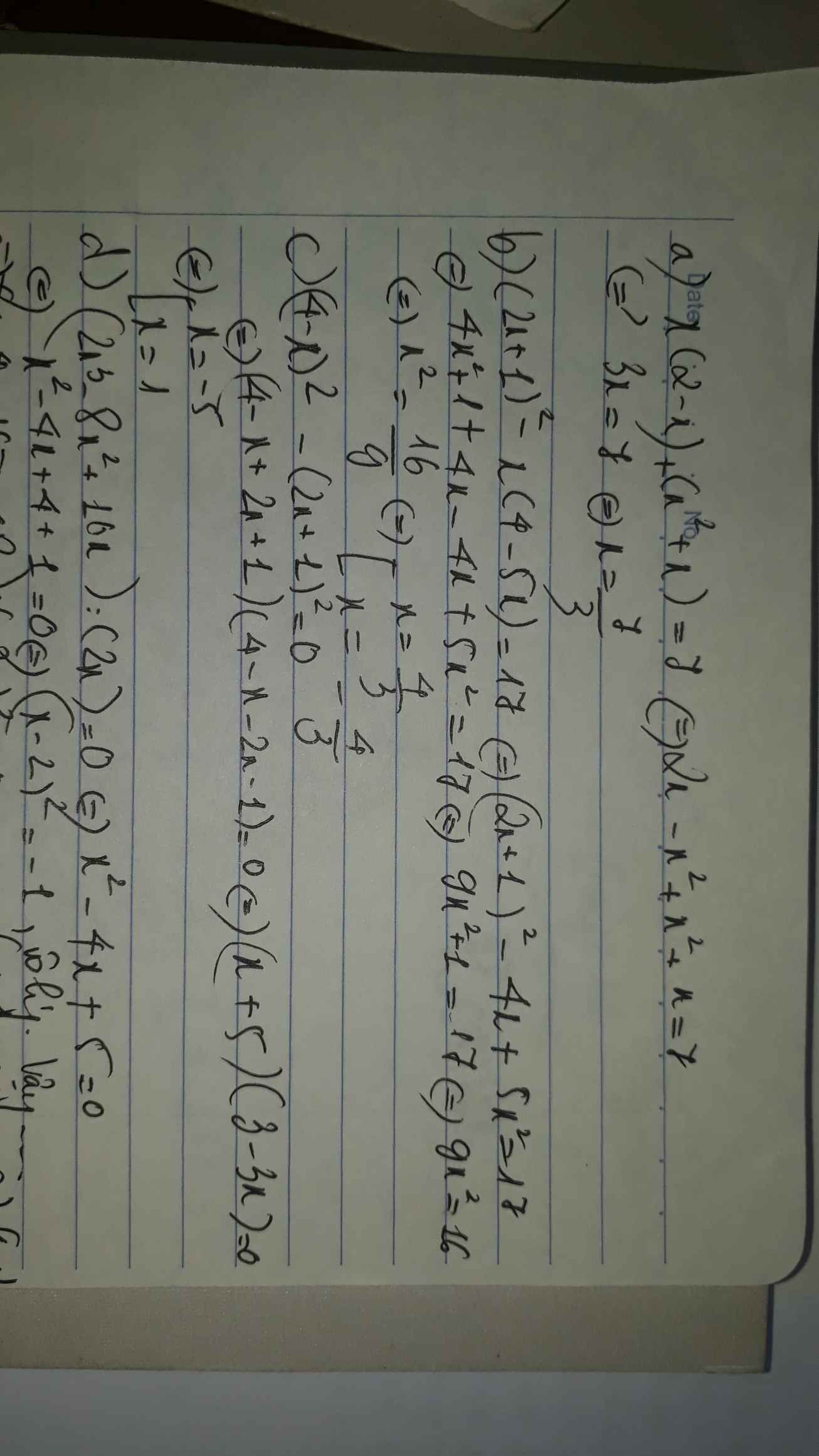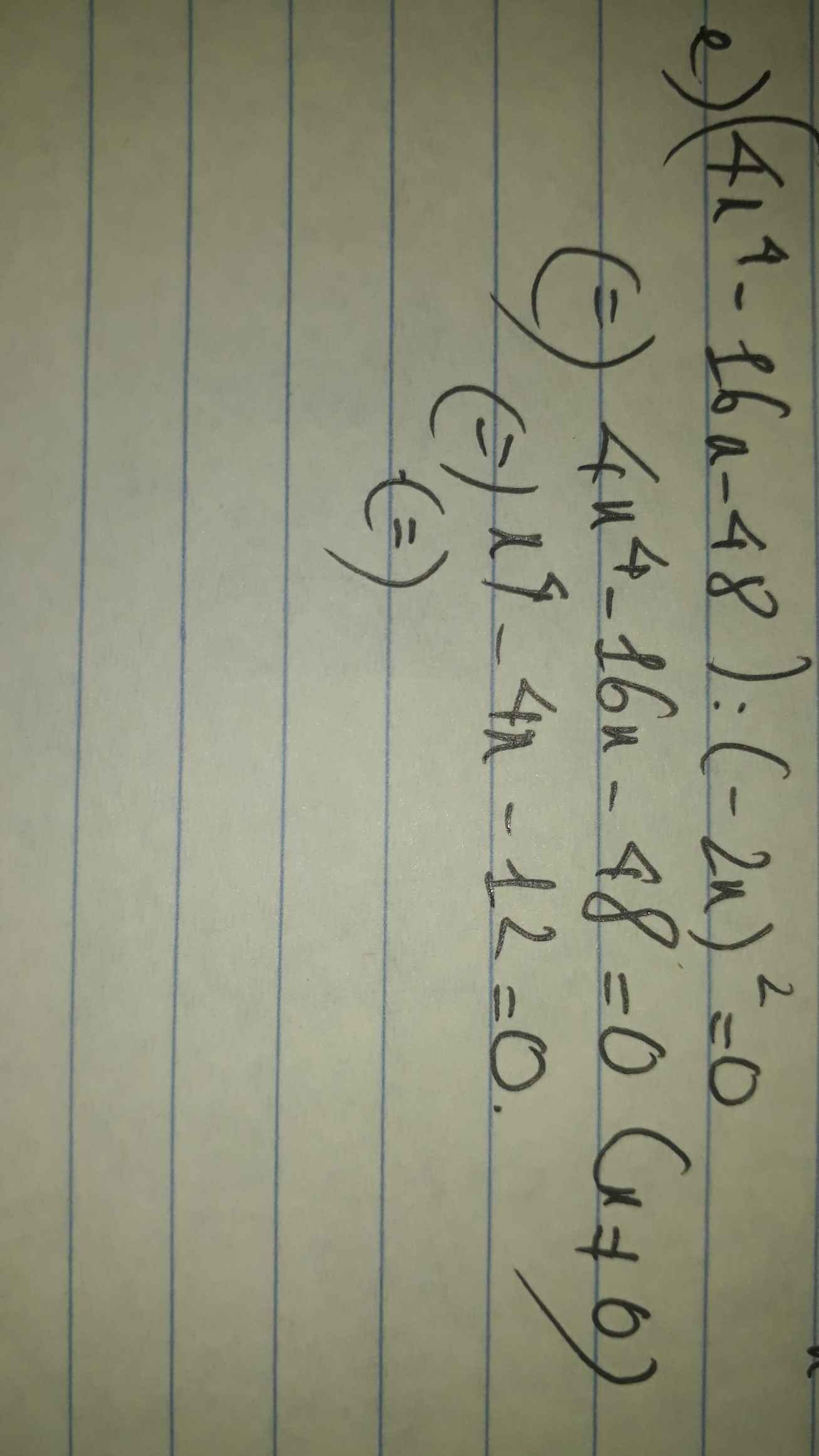TÌM x: x + 2\(\sqrt{2}\)x2 + 2x3 = 0

Những câu hỏi liên quan
1 thưc hiện phép tính
a, 7x2.(2x3+3x5 ) b,(x3-x2+x-1):(x-1)
2 tìm x biết x : x2-8x+7=0
1. a) \(7x^2\left(2x^3+3x^5\right)=7x^2\cdot2x^3+7x^2\cdot3x^5=14x^5+21x^7\)
b) \(\left(x^3-x^2+x-1\right):\left(x-1\right)=\dfrac{x^3-x^2+x-1}{x-1}\)
\(=\dfrac{x^2\left(x-1\right)+\left(x-1\right)}{x-1}=\dfrac{\left(x-1\right)\left(x^2+1\right)}{x-1}=x^2+1\)
Đúng 0
Bình luận (0)
2: \(x^2-8x+7=0\)
=>\(x^2-x-7x+7=0\)
=>\(x\left(x-1\right)-7\left(x-1\right)=0\)
=>\(\left(x-1\right)\left(x-7\right)=0\)
=>\(\left[{}\begin{matrix}x-1=0\\x-7=0\end{matrix}\right.\Leftrightarrow\left[{}\begin{matrix}x=1\\x=7\end{matrix}\right.\)
1:
a: \(7x^2\left(2x^3+3x^5\right)=7x^2\cdot2x^3+7x^2\cdot3x^5=21x^7+14x^5\)
b: \(\dfrac{x^3-x^2+x-1}{x-1}=\dfrac{x^2\left(x-1\right)+\left(x-1\right)}{\left(x-1\right)}\)
\(=x^2+1\)
Đúng 0
Bình luận (0)
1)
\(a,7x^2\cdot(2x^3+3x^5)\\=7x^2\cdot2x^3+7x^2\cdot3x^5\\=14x^5+21x^7\\---\\b,(x^3-x^2+x-1):(x-1)(dkxd:x\ne 1)\\=[x^2(x-1)+(x-1)]:(x-1)\\=(x-1)(x^2+1):(x-1)\\=x^2+1\)
2)
\(x^2-8x+7=0\\\Leftrightarrow x^2-x-7x+7=0\\\Leftrightarrow x(x-1)-7(x-1)=0\\\Leftrightarrow (x-1)(x-7)=0\)
\(\Leftrightarrow\left[{}\begin{matrix}x-1=0\\x-7=0\end{matrix}\right.\Leftrightarrow\left[{}\begin{matrix}x=1\\x=7\end{matrix}\right.\)
\(\text{#}Toru\)
Đúng 1
Bình luận (0)
Tìm x:
a) x(2-x)+(x2+x)=7
b) (2x+1)2-x(4-5x)=17
c) (4-x)2-(2x+1)2=0
d) (2x3-8x2+10x) : (2x)=0
e) (4x4-16x-48) : (-2x)2=0
a: Ta có: \(x\left(2-x\right)+\left(x^2+x\right)=7\)
\(\Leftrightarrow2x-x^2+x^2+x=7\)
\(\Leftrightarrow3x=7\)
hay \(x=\dfrac{7}{3}\)
b: Ta có: \(\left(2x+1\right)^2-x\left(4-5x\right)=17\)
\(\Leftrightarrow4x^2+4x+1-4x+5x^2=17\)
\(\Leftrightarrow9x^2=16\)
\(\Leftrightarrow x^2=\dfrac{16}{9}\)
hay \(x\in\left\{\dfrac{4}{3};-\dfrac{4}{3}\right\}\)
Đúng 0
Bình luận (0)
c: Ta có: \(\left(x-4\right)^2-\left(2x+1\right)^2=0\)
\(\Leftrightarrow\left(x-4-2x-1\right)\left(x-4+2x+1\right)=0\)
\(\Leftrightarrow\left(x+5\right)\left(x-1\right)=0\)
\(\Leftrightarrow\left[{}\begin{matrix}x=-5\\x=1\end{matrix}\right.\)
d: ta có: \(\dfrac{2x^3-8x^2+10x}{2x}=0\)
\(\Leftrightarrow x^2-4x+5=0\)
\(\Leftrightarrow\left(x-2\right)^2+1=0\)(vô lý)
Đúng 0
Bình luận (0)
Câu 9. Tìm x biết : 4x 2 - 16 x 0A. x 0 ; x 16B. x -4C. x 0D. x 0 ; x 4Câu 10. Kết quả của phép chia (2x3 - 5x2 + 6x – 15) : (2x – 5) là:A. x + 3B. x – 3C. x2 – 3D. x2 + 3Câu 11. Tính nhanh ( x2 - 4xy + 4y 2 ) : ( 2y - x )A. y - xB. - 2C. 2y - xD. x-2yCâu 12. Tìm a để đa thức x 2 + 12x + a chia hết cho đa thức x + 3 ?A. 18B. 27C. 12D . 20
Đọc tiếp
Câu 9. Tìm x biết : 4x 2 - 16 x =0
A. x = 0 ; x = 16
B. x = -4
C. x = 0
D. x = 0 ; x = 4
Câu 10. Kết quả của phép chia (2x3 - 5x2 + 6x – 15) : (2x – 5) là:
A. x + 3
B. x – 3
C. x2 – 3
D. x2 + 3
Câu 11. Tính nhanh ( x2 - 4xy + 4y 2 ) : ( 2y - x )
A. y - x
B. - 2
C. 2y - x
D. x-2y
Câu 12. Tìm a để đa thức x 2 + 12x + a chia hết cho đa thức x + 3 ?
A. 18
B. 27
C. 12
D . 20
Cho f(x) = 2x3 + 3(a+2)x2 +6a2x. Biết f'(x) > 0 luôn đúng với mọi x và f'(-1) = 6. Tìm a?
f'(x)=2*3x^2+3*2*(a+2)*x+6a^2
=6x^2+6x(a+2)+6a^2
Δ=(6a+12)^2-4*6*6a^2
=36a^2+144a+144-144a^2
=-108a^2+144a+144
f'(x)>0 với mọi x
=>-108a^2+144a+144<0
=>a<-2/3; a>2
f'(-1)=6
=>6*(-1)^2+6*(-1)*(a+2)+6a^2=6
=>6a^2+6-6a-12=6
=>6a^2-6a-12=0
=>a^2-a-2=0
=>a=2(loại) hoặc a=-1(nhận)
Đúng 1
Bình luận (0)
tìm x
a 5x3-7x2-15x+21=0
b (x-3)2=4x2-20x+25
c x+x2-x3-x4=0
d 2x3+3x2+2x+3=0
b: 4x^2-20x+25=(x-3)^2
=>(2x-5)^2=(x-3)^2
=>(2x-5)^2-(x-3)^2=0
=>(2x-5-x+3)(2x-5+x-3)=0
=>(3x-8)(x-2)=0
=>x=8/3 hoặc x=2
c: x+x^2-x^3-x^4=0
=>x(x+1)-x^3(x+1)=0
=>(x+1)(x-x^3)=0
=>(x^3-x)(x+1)=0
=>x(x-1)(x+1)^2=0
=>\(x\in\left\{0;1;-1\right\}\)
d: 2x^3+3x^2+2x+3=0
=>x^2(2x+3)+(2x+3)=0
=>(2x+3)(x^2+1)=0
=>2x+3=0
=>x=-3/2
a: =>x^2(5x-7)-3(5x-7)=0
=>(5x-7)(x^2-3)=0
=>\(x\in\left\{\dfrac{7}{5};\sqrt{3};-\sqrt{3}\right\}\)
Đúng 1
Bình luận (0)
Tìm x bik:
a) 2-x=2 (x-2)3
b) 8x3-72x=0
c)(x-1,5)6+2(1,5-x)2=0
d) 2x3+3x2+3+2x=0
e) x2(x+1)-x(x+1)+x(x-1)=0
f) x3-4x-14x(x-2)=0
a) Ta có: \(2-x=2\left(x-2\right)^3\)
\(\Leftrightarrow-\left(x-2\right)-2\left(x-2\right)^3=0\)
\(\Leftrightarrow\left(x-2\right)\left[1+2\left(x-2\right)^2\right]=0\)
\(\Leftrightarrow x-2=0\)
hay x=2
b) Ta có: \(8x^3-72x=0\)
\(\Leftrightarrow8x\left(x^2-9\right)=0\)
\(\Leftrightarrow x\left(x-3\right)\left(x+3\right)=0\)
\(\Leftrightarrow\left[{}\begin{matrix}x=0\\x=3\\x=-3\end{matrix}\right.\)
Vậy: S={0;3;-3}
c) Ta có: \(\left(x-1.5\right)^6+2\left(1.5-x\right)^2=0\)
\(\Leftrightarrow\left(x-1.5\right)^2\left[\left(x-1.5\right)^4+2\right]=0\)
\(\Leftrightarrow x-1.5=0\)
hay x=1,5
d) Ta có: \(2x^3+3x^2+3+2x=0\)
\(\Leftrightarrow x^2\left(2x+3\right)+\left(2x+3\right)=0\)
\(\Leftrightarrow2x+3=0\)
\(\Leftrightarrow2x=-3\)
hay \(x=-\dfrac{3}{2}\)
e) Ta có: \(x^2\left(x+1\right)-x\left(x+1\right)+x\left(x-1\right)=0\)
\(\Leftrightarrow x\left(x+1\right)\left(x-1\right)+x\left(x-1\right)=0\)
\(\Leftrightarrow x\left(x-1\right)\left(x+2\right)=0\)
\(\Leftrightarrow\left[{}\begin{matrix}x=0\\x=1\\x=-2\end{matrix}\right.\)
Vậy: S={0;1;-2}
f) Ta có: \(x^3-4x-14x\left(x-2\right)=0\)
\(\Leftrightarrow x\left(x-2\right)\left(x+2\right)-14x\left(x-2\right)=0\)
\(\Leftrightarrow x\left(x-2\right)\left(x-12\right)=0\)
\(\Leftrightarrow\left[{}\begin{matrix}x=0\\x=2\\x=12\end{matrix}\right.\)
Vậy: S={0;2;12}
Đúng 2
Bình luận (0)
Tìm m để pt : (x2- x - m)\(\sqrt{x}\) = 0 có 1 nghiệm phân biệt
Tìm m để pt : (x2- x - m)\(\sqrt{x}\) = 0 có 2 nghiệm phân biệt
Tìm m để pt : (x2- x - m)\(\sqrt{x}\) = 0 có 3 nghiệm phân biệt
ĐKXĐ: \(x\ge0\)
\(\left(x^2-x-m\right)\sqrt{x}=0\)
\(\Leftrightarrow\left[{}\begin{matrix}x=0\\x^2-x-m=0\left(1\right)\end{matrix}\right.\)
Giả sử (1) có nghiệm thì theo Viet ta có \(x_1+x_2=1>0\Rightarrow\left(1\right)\) luôn có ít nhất 1 nghiệm dương nếu có nghiệm
Do đó:
a. Để pt có 1 nghiệm \(\Leftrightarrow\left(1\right)\) vô nghiệm
\(\Leftrightarrow\Delta=1+4m< 0\Leftrightarrow m< -\dfrac{1}{4}\)
b. Để pt có 2 nghiệm pb
TH1: (1) có 1 nghiệm dương và 1 nghiệm bằng 0
\(\Leftrightarrow m=0\)
TH2: (1) có 2 nghiệm trái dấu
\(\Leftrightarrow x_1x_2=-m< 0\Leftrightarrow m>0\)
\(\Rightarrow m\ge0\)
c. Để pt có 3 nghiệm pb \(\Leftrightarrow\) (1) có 2 nghiệm dương pb
\(\Leftrightarrow\left\{{}\begin{matrix}\Delta=1+4m>0\\x_1x_2=-m>0\\\end{matrix}\right.\) \(\Leftrightarrow-\dfrac{1}{4}< m< 0\)
Đúng 3
Bình luận (0)
Tìm A,B
A-(x2 + y2- 4xy)= x2 + 4xy + 3x2
B+(-x4 + x2 - 2x3- \(\dfrac{1}{3}\))=3x2-2x3+x-\(\dfrac{2}{3}\)
\(A-\left(x^2+y^2-4xy\right)=x^2+4xy+3x^2\)
\(\Leftrightarrow A=x^2+4xy+3x^2+x^2+y^2-4xy\)
\(\Leftrightarrow A=5x^2+y^2\)
\(B+\left(-x^4+x^2-2x^3-\dfrac{1}{3}\right)=3x^2-2x^3+x-\dfrac{2}{3}\)
\(\Leftrightarrow B=3x^2-2x^3+x-\dfrac{2}{3}+x^4-x^2+2x^3+\dfrac{1}{3}\)
\(\Leftrightarrow B=x^4+2x^2+x-\dfrac{1}{3}\)
Đúng 4
Bình luận (0)
a) (2x +1)(3 – x)(4 - 2x) = 0 b)2x(x – 3) + 5(x – 3) = 0
c) (x2 – 4) – (x – 2)(3 – 2x) = 0 d) x2 – 5x + 6 = 0
e) (2x + 5)2 = (x + 2)2 f) 2x3 + 6x2 = x2 + 3x
a: (2x+1)(3-x)(4-2x)=0
=>(2x+1)(x-3)(x-2)=0
hay \(x\in\left\{-\dfrac{1}{2};3;2\right\}\)
b: 2x(x-3)+5(x-3)=0
=>(x-3)(2x+5)=0
=>x=3 hoặc x=-5/2
c: =>(x-2)(x+2)+(x-2)(2x-3)=0
=>(x-2)(x+2+2x-3)=0
=>(x-2)(3x-1)=0
=>x=2 hoặc x=1/3
d: =>(x-2)(x-3)=0
=>x=2 hoặc x=3
e: =>(2x+5+x+2)(2x+5-x-2)=0
=>(3x+7)(x+3)=0
=>x=-7/3 hoặc x=-3
f: \(\Leftrightarrow2x^3+5x^2-3x=0\)
\(\Leftrightarrow x\left(2x^2+5x-3\right)=0\)
\(\Leftrightarrow x\left(x+3\right)\left(2x-1\right)=0\)
hay \(x\in\left\{0;-3;\dfrac{1}{2}\right\}\)
Đúng 2
Bình luận (0)
Giải phương trình:
a) x4 - 2x3 + x2 - 4x +4 = 0
b) x4 + 2x3 - 3 = 0
c) 2x4 - 100x + 98 = 0
d) (x + 1)(x + 2)(x + 3)(x + 4) = 24
d: Ta có: \(\left(x+1\right)\left(x+2\right)\left(x+3\right)\left(x+4\right)=24\)
\(\Leftrightarrow\left(x^2+5x+4\right)\left(x^2+5x+6\right)-24=0\)
\(\Leftrightarrow x\left(x+5\right)=0\)
\(\Leftrightarrow\left[{}\begin{matrix}x=0\\x=-5\end{matrix}\right.\)
Đúng 0
Bình luận (0)























